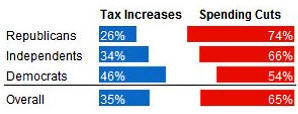On Eve of Default, Debt Limit Talks Collapse
But what about the Constitution? Jul 23 2011Summoned to the White House by the president Saturday, Congressional leaders left after only an hour but began issuing assurances that they would come up with a plan to avoid default. John Boehner expressed confidence that a major plan to cut $3 to $4 trillion from the national debt would be forthcoming. In like manner, Senate Republican leader Mitch McConnell vowed that "Congress is committed to working on new legislation that will prevent default while substantially reducing Washington spending".
But nothing in these pronouncements made any mention of the reciprocal $1 trillion or so in revenue enhancements that had been part of the Grand Design of Boehner and the president before the house speaker walked out of

A Gallup poll shows that only 20%
think there should only be spending cuts.negotiations at the White House Friday saying, "There was no agreement...never an agreement and frankly not close to an agreement". Both seemed to want to make history with a bold course correction for the United States.
Instead, with the nation at stake, we got petulance and rancor from both sides. So now there is every indication that the Republican Congressional leaders intend to present to the president an ultimatum: either sign for potentially huge cuts in non-defense discretionary spending, Social Security, Medicaid and Medicare — and forgot about revenue increases — or there will be no rise in the debt limit.
A strict party line vote in the House would move that forward, but the Democratic majority in the Senate would block it. And were it ever to reach his desk, the president would face insurrection within his party were he to relent to such a one-sided proposition.
Which takes us right back to where we have been for months: drifting toward the falls of default.
Strangely, pundits and the media, as if incredulous that this could be happening, continue to be optimistic that a deal can be reached before August 2 when the United States will otherwise tell the world that the check is no longer in the mail. On that date, by law, the government no longer has the authority to borrow the money it needs to meet the very same obligations Congress itself approved in seven spending resolutions.
Through the months-long negotiations, neither side has released details of their proposals and counter-proposals measured in trillions of dollars, but the source of Boehner's anger was that "the White House moved the goal posts" by calling for last-minute revenue additions. “The only way to get that extra revenue was to raise taxes,” said the House Speaker, and taxes would violate the pledge made by virtually all Republicans to Grover Norquist (see related story).
The President and Boehner have met several times and at one moment hatched a Grand Bargain of up to $3.5 trillion in spending cuts and another trillion in deficit reduction through increased revenue from eliminating what were only vaguely referred to as "loopholes". Obama finally became somewhat more specific saying he had offered more than $1 trillion of cutbacks in discretionary spending, including defense, and $650 billion of reductions to Social Security, Medicare and Medicaid.
Mr. Boehner said that $800 billion in revenue increases had been agreed to. The president has spoken only of examples such as eliminating rapid write-off of corporate jets (which would increase taxable corporate profits), and doing away with taxing the multi-million paychecks of hedge fund CEO's at no more than someone earning $16,000 a year. But these anecdotal items clearly do not add up to $800 billion.
But then Mr. Obama pressed for $400 billion more, according to Boehner, presumably resuming his continuing drive to see rates raised from 35% to 39.5% for those with taxable incomes of over $250,000. "It is hard to understand why speaker Boehner would walk away from this kind of deal”, was the president's verdict. "Can they say ‘yes’ to anything"?
But all of this took place in a parallel universe. Even if Obama and Boehner agreed to their Grand Bargain, given the intransigence of Republicans and their pledges to not raise taxes despite the country having run up $14.3 in debt, and given the obduracy of the Democrats who somehow think that Medicare in particular can go on unperturbed despite looming bankruptcy, they could never get the votes in Congress. The House and Senate are Thelma and Louise, speeding to the cliff edge.
Which leaves the Constitution. Couldn't the president simply ignore Congress and, to avoid default, invoke Section IV of the 4th Amendment which states in no uncertain terms, that "the validity of the public debt of the United States, authorized by law, including debts incurred for payment of pensions and bounties for services in suppressing insurrection or rebellion, shall not be questioned"?
Please subscribe if you haven't, or post a comment below about this article, or
click here to go to our front page.


We shocked ourselves a little in Germany, the amount debt America is doing. That may not go well at some point. That cannot go well at some point. I think the armed forces expenditure must be lowered. Eventually The united states can not manage.